YEREVAN—The Provost of the University of Southern California, Dr. Michael Quick, and Dr. Anthony Bailey, University of Southern California’s (USC) Vice-President for Strategic and Global Initiatives, as well as dignitaries and over 20 scholars from Armenia and around the world participated in the second part of “The End of Transition: Shifting Focus a Quarter Century After the Soviet Collapse” international conference, held on May 23-24, in Yerevan.
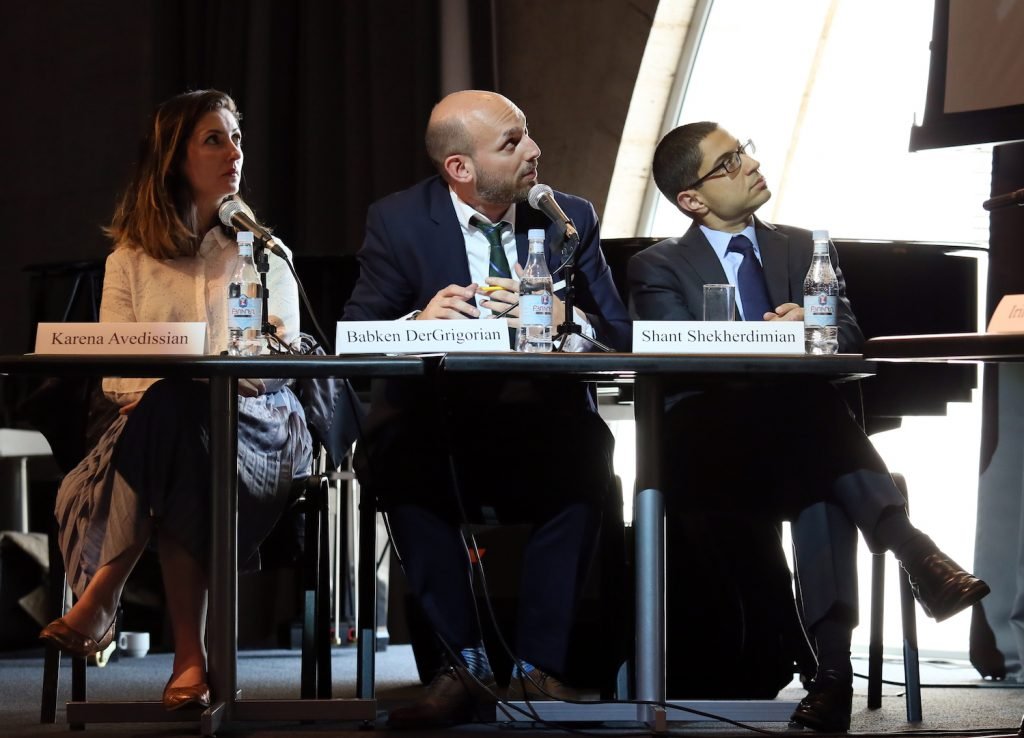
Organized by the USC Institute of Armenian Studies, the conference’s first part was held on the USC campus April 9-10, and featured scholars and specialists from across the globe as they discussed Armenia’s trajectory since independence in 1991.
Salpi Ghazarian, the director of the Institute, opened the conference. Provost Quick, Vice President Bailey, and Deputy Director of the USC School of International Relations and moderator of the conference, Professor Rob English, presented the opening remarks.
“This conference reflects our commitment to be that essential bridge between the problems and challenges facing Armenia and Armenians, and those with the intellectual and academic skill and passion to tackle them.” said Salpi Ghazarian, director of the USC Institute of Armenian Studies.
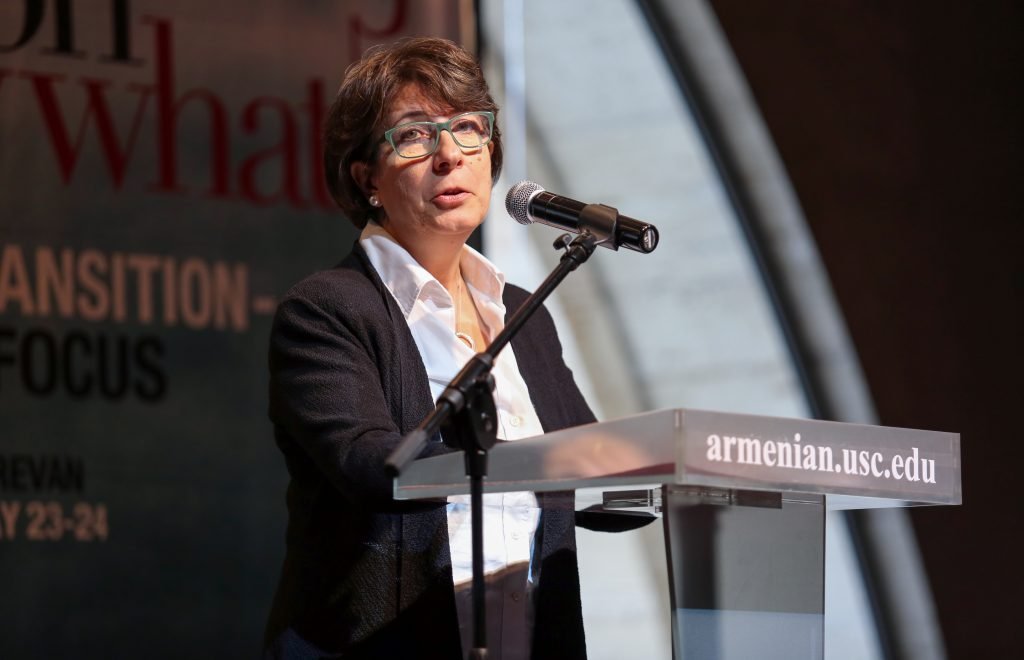
Provost Quick, who spent his first day in Yerevan visiting the American University of Armenia, TUMO, and CivilNet, as well as the Genocide Memorial and Museum and other sites in Yerevan, reflected on his experences. “The past is present in Armenia like no other place I have ever visited in the world, whether it’s around the issue of genocide, or whether it’s around the issue that we’re going to be talking about today and tomorrow about the 25 years since the break up of the Soviet Union. But I realize it’s not just about the past. It’s about how that past influences the future.”
Vice President Bailey said, “Part of my role here today is to tell you that the USC Institute of Armenian Studies is the most important international center at USC.”
The conference opened on the afternoon of May 23. In addition to the USC guests, special speakers included Ambassador Jack Matlock, the last U.S. envoy to the USSR; Ambassador Ed Djerejian, director of the Baker Institute at Rice University and a former U.S. diplomat with extensive experience in Russia and the Middle East; Tim Judah, a Balkans expert and writer for the Economist and the New York Review of Books; Professor Ronald Suny of the University of Chicago who has specialized in the Soviet and post-Soviet space, with a special focus on the Caucasus; Dr. Hans Gutbrod founder of Transparify, formerly with the Caucasus Research Resource Centers; Garik Hayrapetyan of the UN Fund for Population Activities on the demographics of transition, and finally, Russia-based author and journalist Anna Arutunyan.
Professor Ronald Suny presented the first talk of the conference, summarizing the relations between the West, Turkey, and Russia.
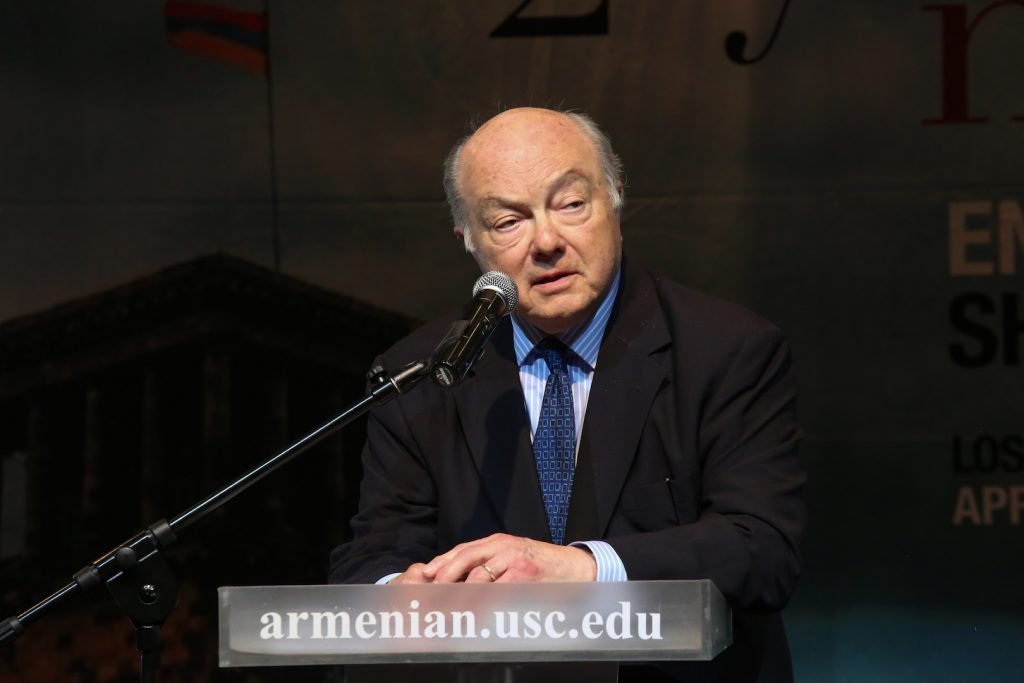
Suny noted that one of the most important factors to remember is how important and central Russia is to any of the problems in the South Caucuses. “What if Russia were the power that, in fact, could bring some kind of solution to the problems in the South Caucasus?” he said.
Ambassador Matlock, who served between 1987 and 1991, discussed the evolution of US-Russia relations since the fall of the Soviet Union and the impact of this relationship on the South Caucasus region. Matlock noted that, as long as Russia continues to sense growing hostility and rivaly from the US, it will take reactionary steps to ascertain itself not only regionally but internationally. “What Putin, internationally, has reacted negatively to is what he considers an effort to put him down,” Matlock said.
Ambassador Ed Djerejian took the stage next. He further expanded on the important role of US-Russia relations on Armenia. “Armenia’s future is linked, in an important way, to the way in which the US-Russia relationship is going to evolve,” Ambassador Djerejian noted.
Following the individual presentations, Professor Suny, Ambassador Matlock and Ambassador Djerejian engaged in a conversation moderated by Professor English. They focused on the impact of regional and global hegemons on Armenia’s transition since the collapse of the Soviet Union.
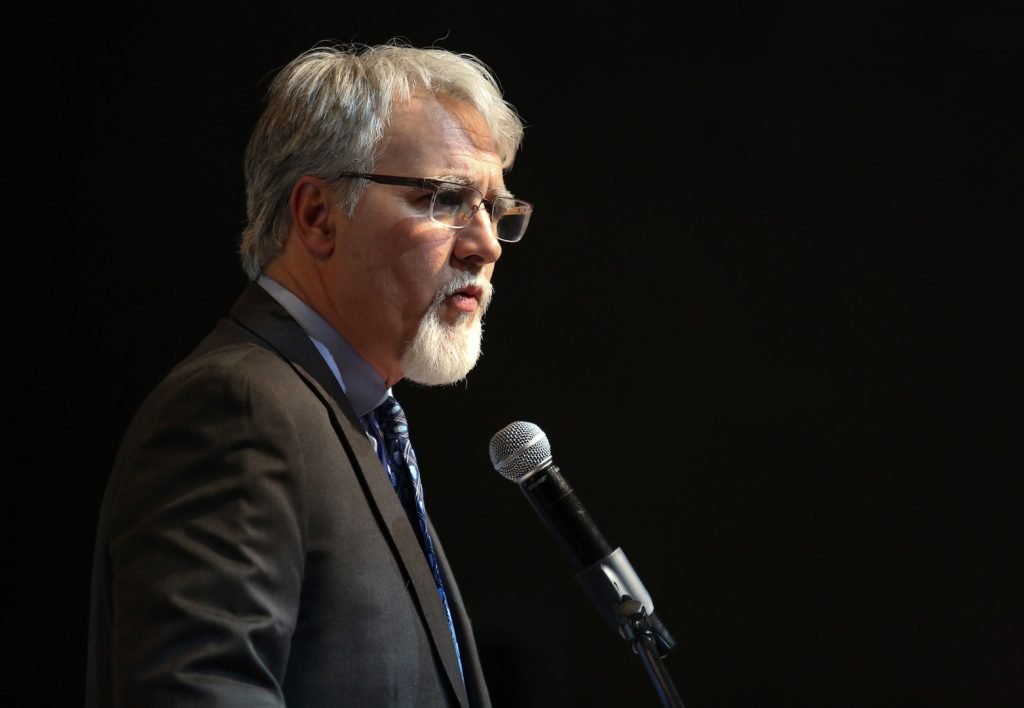
The panelists agreed on the growing role of Russia in the region and the need for the U.S. to take into account Russia’s regional interests.
“Armenia should, of course, act in its own interests, but those interests involve the other great powers around it and the limits placed on it by those particular powers. And those interests have to maybe be more carefully defined at times. They go in all kinds of different directions,” Ron Suny concluded.
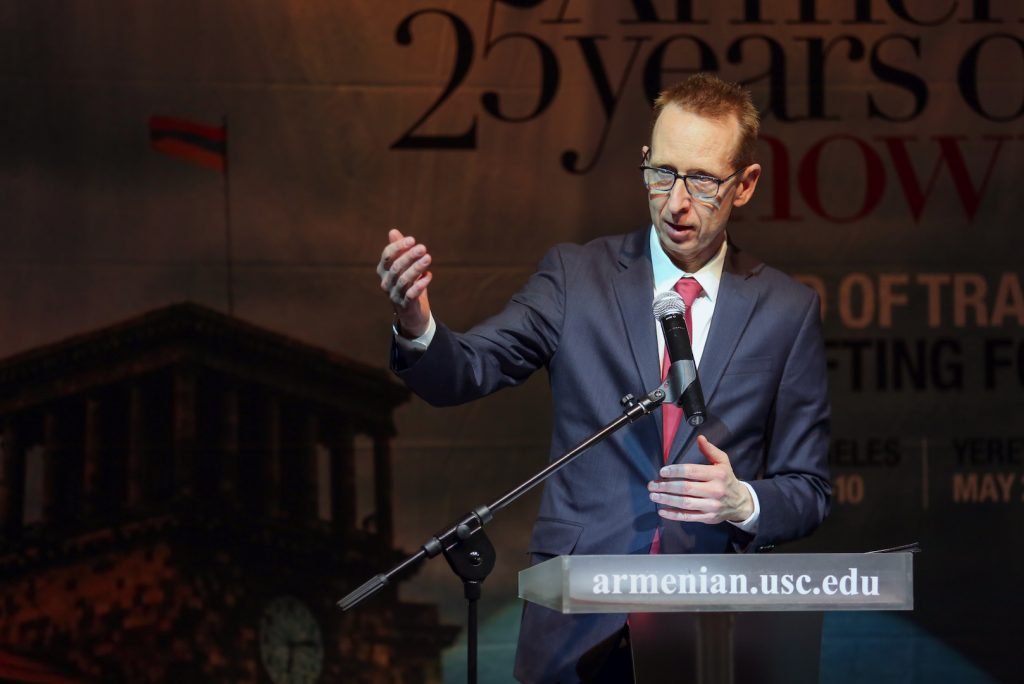
The conference continued with the next speaker, Anna Arutunyan, a journalist and author of The Putin Mystique. Arutunyan highlighted the focal points of transition for both Russia and the independent states during the last 25 years.
She said, “In the case of Russia, when we look at it as transitioning, we think transition from point A to point B, from yesterday to tomorrow, from tyranny to freedom. It’s a binary issue. And that in itself, that view, has embedded with it a path dependency.”
Following the conversation on Russia, Garik Hayrapetyan of the United Nations Population Fund summarized the data related to the demographics of transition. Out-migration, sex-selected abortions, and an aging population are all part of this conversation. Talking specifically about sex-selected abortions, Hayrapetyan noted, “If we continue the trend like this, by 2060, Armenia will lose 93,000 girls.”
Dr. Hans Gutbrod, director of Transparify, a policy research and advocacy organization based in Tbilisi, Georgia, discussed global and regional trends in democracy development, or what he called “ten years of backsliding of democracy.” Gutbrod’s presentation focused on local activism and policy changes that can have impact on the next stages of transition. He highlighted Georgia as an important example of transition.

“Why was change possible? Small teams of people who trusted each other worked together, a mix of insiders and outsiders that brought relevant expertise, and an emphasis on delivery in the first six months so you could actually make change and have an impact. Georgia shows that change is possible, even in places where it seems like people have given up,” he noted.
Changing the topic from regional to domestic issues, Gutbrod discussed the need to tackle more specific domestic issues, such as immigration, women’s rights, and more. “We need to also have a transition in our thinking. It’s not only enough now to target fertility in our policies. What we need to target is more gender equality, increasing of women’s roles in our society because it’s women who decide if they should have more children or not.”
Tuesday’s final speaker was Tim Judah, the Balkans correspondent for The Economist. To offer a comparative element, Judah explained the transitional processes in the Balkans, noting, “In the former Yugoslavia, nobody had much time for expectations. And communism, unlike in Armenia, didn’t collapse, it just fizzled out.”
He mentioned that the Kosovo War was also important because it propelled Bulgaria and Romania into NATO and sooner, rather than later, into the EU. This significantly impacted the transition process in the Balkans.
The conference continued on May 24. The first panel—The Beginning and End of Transition—was chaired by Anna Arutunyan.
Professor Robert English opened the panel with a talk entitled, “Russia, Trump, and a new Détente.” He addressed Washington’s obsession with Russia’s potential meddling in U.S. elections and the need to move beyond smaller issues into the larger picture of the relations between the two powers. “As long as this cloud hangs over the Trump administration, any progress or relations with Russia will be viewed as Kremlin manipulation; Congress will not provide any funding or support any initiative,” Professor English noted.
Professor Ugur Ümit Üngör from the Netherlands addressed the evolving relations between Armenians and Turks. His talk was focused on the Armenian Genocide and its aftermath; evolving social and political relations in the past decades; and the issue of leadership in both countries.
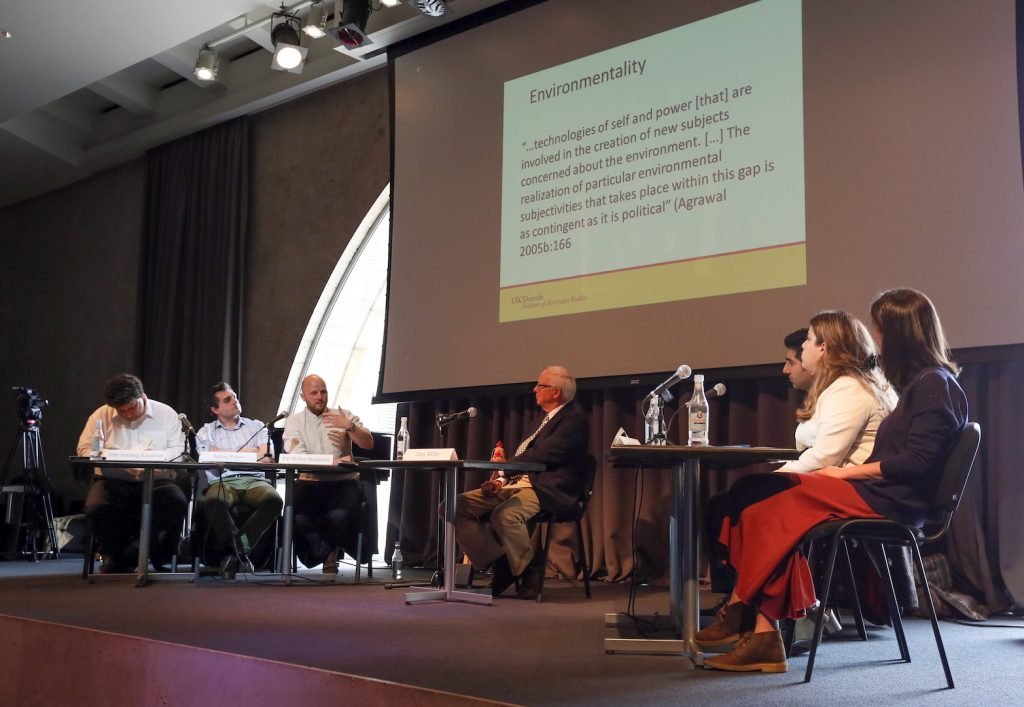
Referencing Professor Suny’s discussion on transitology, he noted that there is one element of this that is relevant to Armenian-Turkish relations, which is transitional justice. This is a burgeoning field that looks at the aftermath of mass crimes, such as genocide.
Pointing out the importance of the event in the present, Professor Üngör said, “There is no single interaction between any single Armenian or Turk, either at a café or at a university or in a business setting that the genocide does not cast a shadow on. The genocide looms large.”
Continuing the conversation, Director of the Armenian Communities Department at the Calouste Gulbenkian Foundation in Lisbon, Dr. Razmik Panossian, asked in his presentation on Trends and Lessons from Transitions, “Where are we now, globally?” His talk addressed issues of electoral illiberalism, consolidation of elites in government, as well as ineffective or “tired” civil societies.
Calling on the Diaspora, Dr. Panossian asked again, “The choice that we, as Diasporan Armenians, have vis-à-vis Armenia itself, given this rather bleak picture, is, do we accept it as it is with the occasional visit, do we engage with Armenia for change, or do we turn back and move on?”
Professor Georgi Derlugian from New York University in Abu Dhabi, focused his talk on the development of democracy in Armenia and all the various factors that affect this.
Despite all the challenges in Armenia, Derlugian stressed that one should not take for granted the independence of Armenia. “We have a multilingual population…we have refugees now arriving from countries like Syria. This is a burden in the short term. This is, if we manage to keep them, a great investment. So the situation is actually begging for a developmental state.”
The second panel—Civic Culture and Social Change—was moderated by Professor Don Miller, Director of the Center for Religion and Civic Culture at USC.
Professor Miller opened the panel by defining the term civil society, noting that, “Central to civil society are the values of free speech, the right to advocate for the public. A vibrant civil society typically has multiple contending voices that are a part of that.
The first presenter of the panel was Dr. Pål Wilter Skedsmo from the Fridtjof Nansen Institute in Norway. Dr. Skedsmo’s talk focused on environmental rights in Post-Soviet Armenia. Yerevan’s urban landscape since independence was discussed by Vrej Haroutounian, a graduate student at the University of Edinburgh in Scotland. The conversation turned to Georgia with Professor Anton Popov from the UK, who presented a talk entitled, “Rebabilitating Telavi: Politics of Historical Heritage in Post-Soviet Georgia.” The changing roles of Armenian churches was discussed by Sabrina Papazian from Stanford University. Dr. Antranig Kasparian addressed the changing motives and modalities of charitable assistance from the Diaspora over a quarter century. The Diaspora conversation continued with Eviya Hovhannisyan from European University at Saint-Petersburg in Russia.
In between the panels, the audience enjoyed a brief presentation by filmmaker Eric Nazarian on the transitioning of post-Soviet cinema in Armenia. He mentioned the urgent need to present Armenia and Armenians in cinema with its new, 21st century identity.
“The first time audiences around the world were exposed to the concept of an Armenian was of a destroyed, victimized, repressed, brutalized, raped race…as they say, you don’t get a second chance to make a first impression. This was the first impression the world got of Armenians—as a victimized nation, aka the starving Armenians.”
Following Nazarian, philanthropist Ruben Vardanyan, took the stage to discuss approaches to the next stage of transition in Armenia. He talked about his desire to do something more systemic to address development in Armenia. “Let’s try to go from the vision to execution, which is sometimes the more difficult part of transition,” he said.
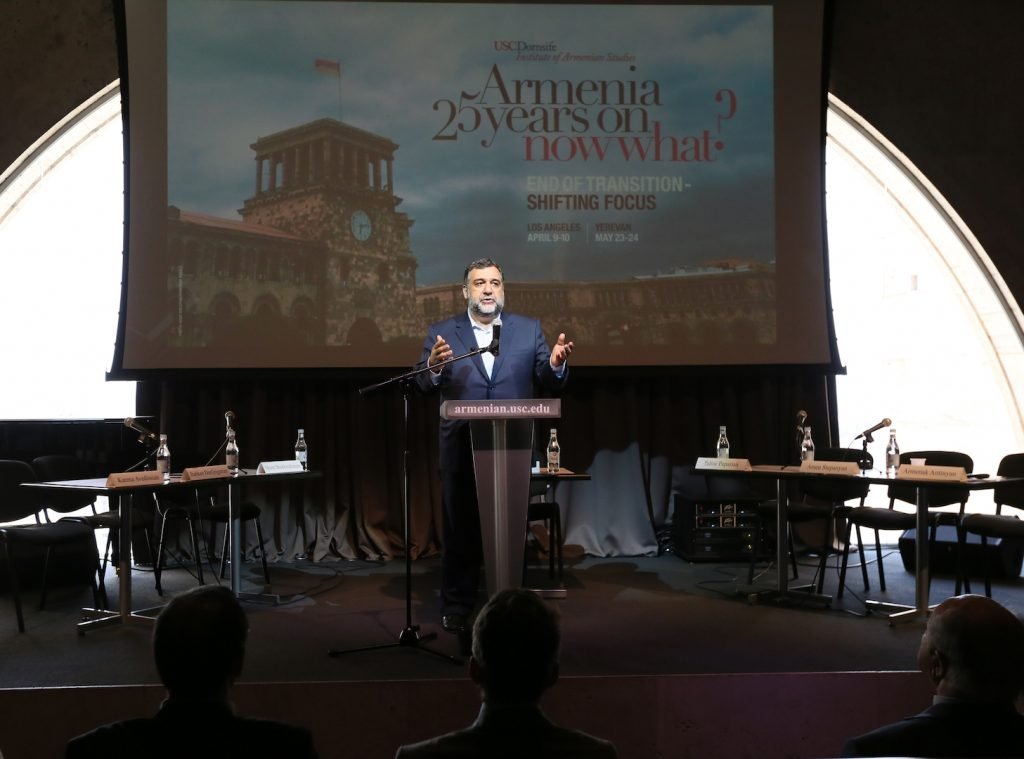
Mr. Vardanyan discussed the impact of his initiatives, taken by his family foundation, or with the collaboration of friends and other investors. Those initiatives range from development projects which focus on advancing education, expanding tourism, and developing local economies through the IDEA Foundation. In turn, the Aurora Humanitarian Initiative aims to put Armenia in a global context.
Dr. Irina Ghaplanyan moderated the third panel on Governance and Economy.
Professor Armenak Atinyan from Tianjin University in China opened the panel with a presentation on the impact of temporary migration in the South Caucasus. Dr. Taline Papazian discussed the role of the Yerkrapah in the institutional development of democracy. Discussing ‘hybrid regimes,’ Babken DerGrigorian presented Armenia as a case of anocracy. The conversation changed to healthcare as Shant Shekherdimian of the University of California, Los Angeles, discussed the efficiency, or lack thereof, of the Diaspora’s efforts in healthcare in Armenia.
Building on previous research done by Professor Don Miller, Dr. Karena Avedissian presented a talk on her current research on post-Soviet perceptions of poverty and unequal wealth. Arsen Stepanyan addressed the transition in legislative processes in Armenia since the collapse of the Soviet Union.
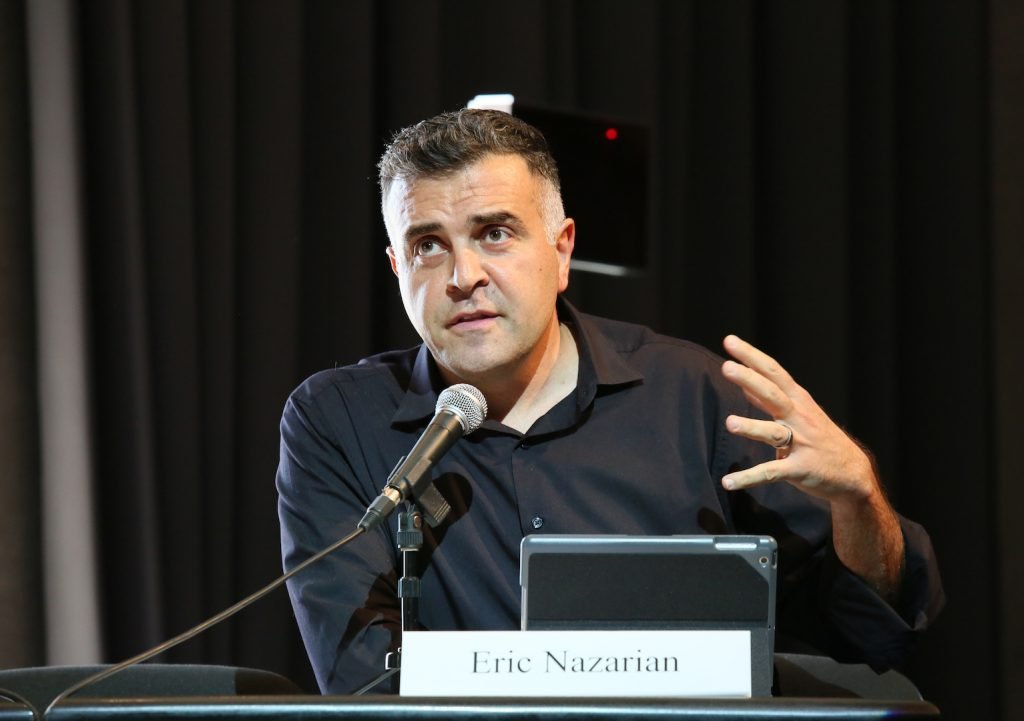
The last panel of the conference, entitled Foreign Policy and Regional Integration, was moderated by Dr. Hans Gutbrod. Presenters focused on Russia, Iran, the European Union, and Georgia.
Professor Mikayel Zolyan of Yerevan’s Brusov University addressed the paradoxes of Russian-Armenian relations. Iran’s relationship with Armenia was covered by Iran-based scholar Robert Markarian. Armen Grigoryan of the Central European University in Hungary presented on Armenia and the European Union, with a focus on lessons from Georgia, Moldova, and Ukraine. Georgia-Armenia relations were addressed by Tamar Kutsishvili.
“Apart from the evident value of bringing together the experiences of these scholars and diplomats, this conference is proof of the need to support deeper research into all aspects of development in the Republic of Armenia. The Institute has embarked on supporting research in and about Karabagh; we continued with offering assistance for research on aspects of the transition process. We intend to continue to identify critical areas of research needed to address national challenges,” said Salpi Ghazarian.
Video of the two-day conference in Yerevan is available below.
Video of the two-day conference in Los Angeles is available below.
The Institute of Armenian Studies promotes research, scholarship and programming that address national and global challenges and seek to contribute to policy that impacts the development of Armenian communities and the Armenian Republic.



Be the first to comment